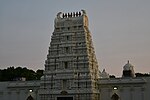WAMG
1994 establishments in MassachusettsCompanies based in Dedham, MassachusettsMass media in Norfolk County, MassachusettsRadio stations established in 1994Radio stations in Boston ... and 2 more
Spanish-language radio stations in MassachusettsTropical music radio stations

WAMG (890 AM; "La Mega") is a radio station in the Boston market licensed to Dedham, Massachusetts. It is owned by Gois Broadcasting. It broadcasts in Spanish, and plays bachata, merengue, salsa and pop music. WLS in Chicago is the dominant (class A) station on 890 AM; WAMG must reduce power during the nighttime hours and uses a directional antenna to protect the nighttime skywave signal of WLS. WAMG also simulcasts its programming on WLLH (1400 AM) in Lowell and Lawrence to reach the area north of Boston and the southern part of New Hampshire. It also operates translator W235CS (94.9 FM) in Dedham.
Excerpt from the Wikipedia article WAMG (License: CC BY-SA 3.0, Authors, Images).WAMG
Adams Road,
Geographical coordinates (GPS) Address Nearby Places Show on map
Geographical coordinates (GPS)
| Latitude | Longitude |
|---|---|
| N 42.247222222222 ° | E -71.425277777778 ° |
Address
WBMA-AM (Sherborn)
Adams Road
01721
Massachusetts, United States
Open on Google Maps






